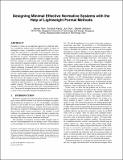Designing minimal effective normative systems with the help of lightweight formal methods
Author(s)
Hao, Jianye; Kang, Eunsuk; Sun, Jun; Jackson, Daniel
DownloadDesigning minimal.pdf (522.3Kb)
OPEN_ACCESS_POLICY
Open Access Policy
Creative Commons Attribution-Noncommercial-Share Alike
Terms of use
Metadata
Show full item recordAbstract
Normative systems (i.e., a set of rules) are an important approach to achieving effective coordination among (often an arbitrary number of) agents in multiagent systems. A normative system should be effective in ensuring the satisfaction of a desirable system property, and minimal (i.e., not containing norms that unnecessarily over-constrain the behaviors of agents). Designing or even automatically synthesizing minimal effective normative systems is highly non-trivial. Previous attempts on synthesizing such systems through simulations often fail to generate normative systems which are both minimal and effective. In this work, we propose a framework that facilitates designing of minimal effective normative systems using lightweight formal methods. Given a minimal effective normative system which coordinates many agents must be minimal and effective for a small number of agents, we start with automatically synthesizing one such system with a few agents. We then increase the number of agents so as to check whether the same design remains minimal and effective. If it is, we manually establish an induction proof so as to lift the design to an arbitrary number of agents.
Date issued
2016-11Department
Massachusetts Institute of Technology. Department of Electrical Engineering and Computer ScienceJournal
Proceedings of the 2016 24th ACM SIGSOFT International Symposium on Foundations of Software Engineering - FSE 2016
Publisher
Association for Computing Machinery
Citation
Hao, Jianye, et al. "Designing Minimal Effective Normative Systems with the Help of Lightweight Formal Methods." Proceedings of the 2016 24th ACM SIGSOFT International Symposium on Foundations of Software Engineering, 13-18 November, 2016, New York, New York, ACM Press, 2016, pp. 50–60.
Version: Author's final manuscript
ISBN
978-1-4503-4218-6